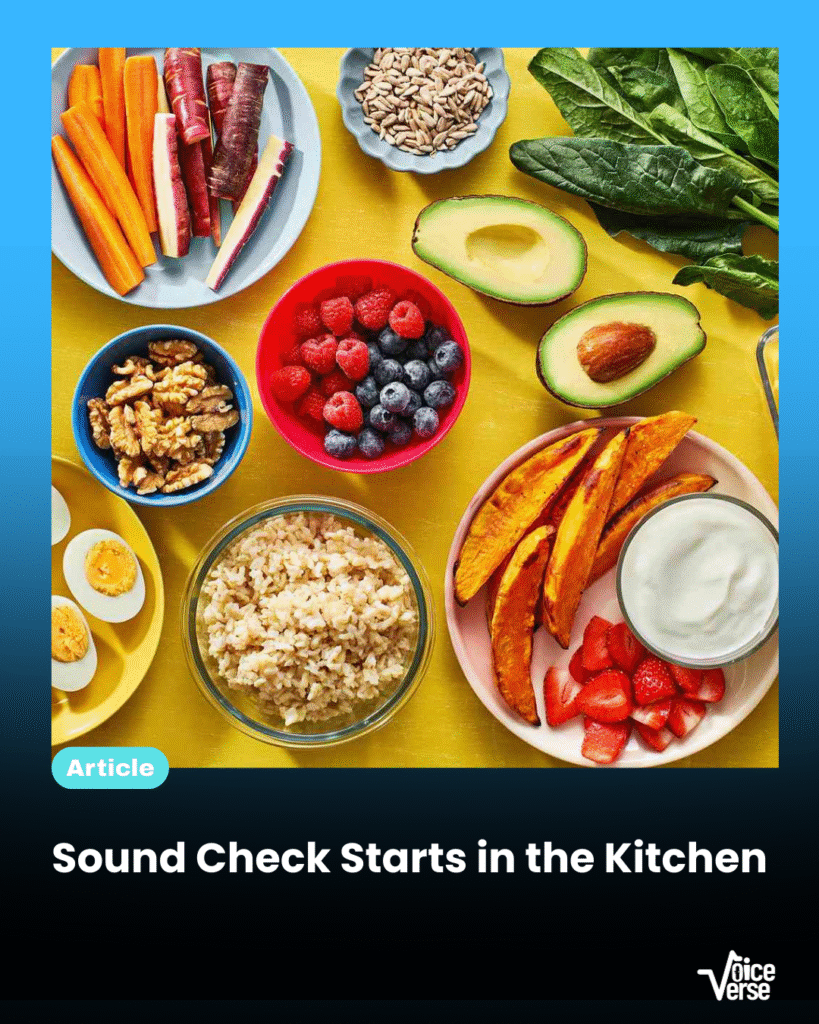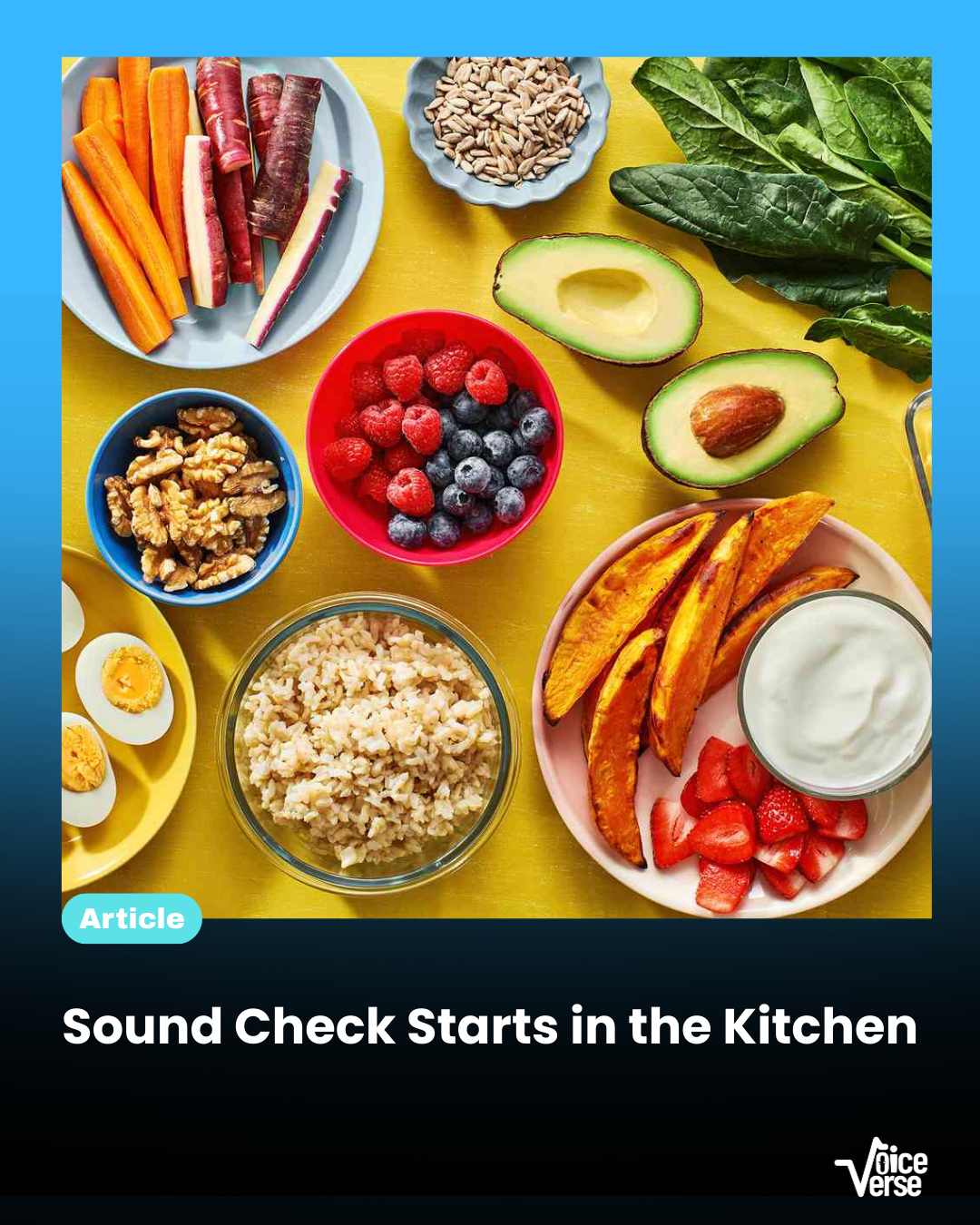By Rukayat Alabede
As a voice artist, your voice is your primary tool, and you must care for your vocal cords, the way a musician would care for his instrument or a businessman, his cherished product or service.
Simply put, voice artists ought to be extremely cautious of what goes into their system through the mouth, as a healthy diet plays a major role in maintaining vocal strength and clarity.

As the saying goes, you are what you eat.
Here are some foods and drinks that support a healthy voice and help maintain that crispy, clear tone.
Water
As a voiceover artist, water should be your best friend because hydration is everything. It goes without saying that your vocal cords need to stay moist to vibrate properly. It is vital to drink at least 2 to 3 litres of water daily or more, especially if you are in a dry environment or recording for long hours. Sip warm water during sessions to keep your cords relaxed.
Fresh Fruits and Vegetables
Fruits like apples, pears, and melons are hydrating and help cleanse the mouth and throat. Leafy greens, carrots, and sweet potatoes are packed with vitamins A and C, which support the health of mucous membranes, and it’s crucial for vocal care.
Before you start scrutinizing the current prices of these fruits, let me give you a quick fact about apples.
Did you know that apples, particularly green apples, are good for voice artists because their acidity helps clean the mouth and throat, flush out mucus, and stimulate saliva production, which can temporarily reduce mouth noises like clicks and smacks that are audible during recordings?
They also provide hydration and beneficial flavonoids. So you see, an apple a day doesn’t just keep the doctor away; it does so much more.
Herbal Teas
Taking warm herbal teas like chamomile, ginger, and licorice root tea can soothe the throat, reduce inflammation, and promote vocal comfort. It is nonetheless important to avoid teas with caffeine and not abuse these teas.
Whole Grains and Lean Proteins
Whole grains provide sustained energy for long recording sessions. Lean meats, eggs, and legumes support muscle function, including the muscles of your vocal cords.
Healthy Fats
Always take healthy fats like avocados, olive oil, nuts, and seeds. They help reduce inflammation and keep your throat healthy.
Now that you know what to allow in, here are some foods you need to avoid or at least reduce to the barest minimum.
Dairy Products
It should be noted that dairy products like milk, cheese and ice cream can increase mucus production, which may lead to throat clearing; a bad habit that can damage your vocal cords.
Spicy and Acidic Foods
These includes chili, citrus and vinegar among others, which can irritate the throat or trigger reflux which damage the vocal cords overtime.
Caffeine and Alcohol
If as a voice over artist, you are in anyway addicted to the above mentioned, then you sincerely need to STOP, period!
Caffeine and alcohol are detrimental to a voice artist’s performance and long-term vocal health because they dehydrate the body, dry out vocal cords, cause friction, and can trigger acid reflux. While caffeine is a diuretic, which increases the loss of body fluids, alcohol dehydrates the system. Both substances can lead to increased vocal strain, reduced vocal flexibility, a rough or hoarse voice, and difficulties with vocal projection and control. Please, if you must have caffeine, always balance it with plenty of water.
Sugary Snacks and Soda
This one is for all voice artists with a notorious sweet tooth. Cake, icing sugar, carbonated soft drinks, etc., can be very tempting and sometimes addictive. However, refined sugar causes inflammation and mucus buildup. Carbonated drinks also introduce unwanted gas and cause continuous burping. So, dear voice artist who wants to go global, avoid sugar.
Now that we’ve successfully noted and crossed out foods we should stock up and avoid, here are some pre-session vocal tips to help stay sharp, in shape, and in tune as a voiceover artist.
Eat light and clean about 1-2hours before recording
To eat clean is to prioritize whole, minimally processed foods that are close to their natural state, such as fresh fruits, vegetables, whole grains, and lean proteins, while minimizing foods high in added sugars, sodium, unhealthy fats, and artificial additives.
Avoid large meals
It is best to eat smaller, more frequent meals instead of large ones which can lead to sluggishness and reflux.
- Drink warm tea or water before and during your sessions. Drinking it after sessions wouldn’t hurt either. After all, “water no get enemy.”
- Use raw honey or lozenges to coat and soothe the throat if you feel dryness.
Eat high-water-content vegetables
These include cucumbers (96% water), celery (95% water), lettuce (95-96% water), radishes (95% water), zucchini (94% water), and tomatoes (94-95% water).
Other hydrating options are spinach (93% water), bell peppers (92% water), cauliflower (92% water), and mushrooms (92% water). These vegetables also provide essential nutrients like fiber, vitamins, and minerals to support overall health.
Conclusion
A poor diet affects your vocal stamina and overall ability to perform. A healthy voiceover diet isn’t just about sounding better today; it is about protecting your voice for years to come.
Be mindful of what you eat, stay hydrated, rest your voice when needed, and treat it like the powerful, delicate instrument it is. Your voice is priceless; treat it as such!
Follow @voiceverseng on Instagram and across other socials for more updates from the voiceover world.



